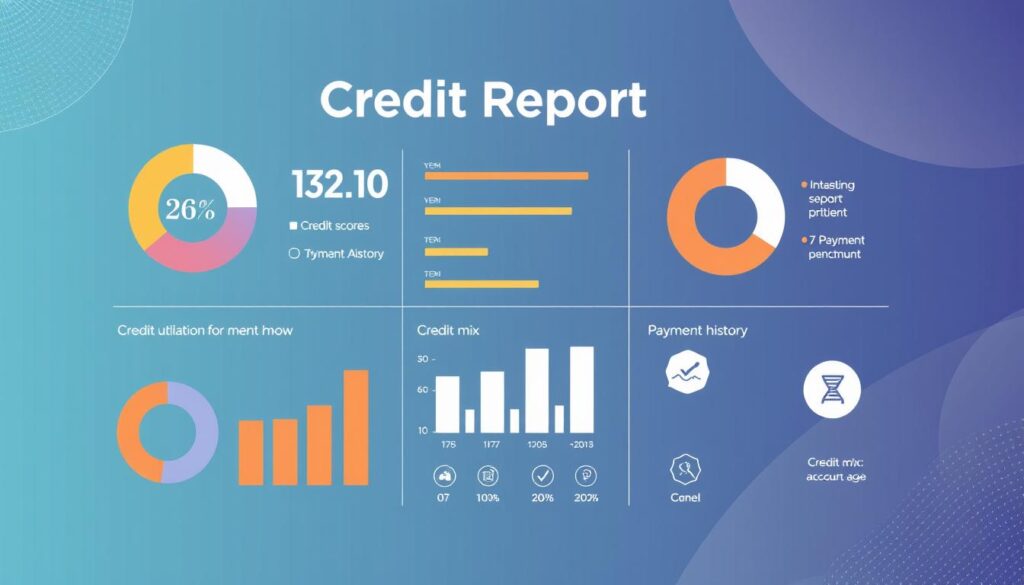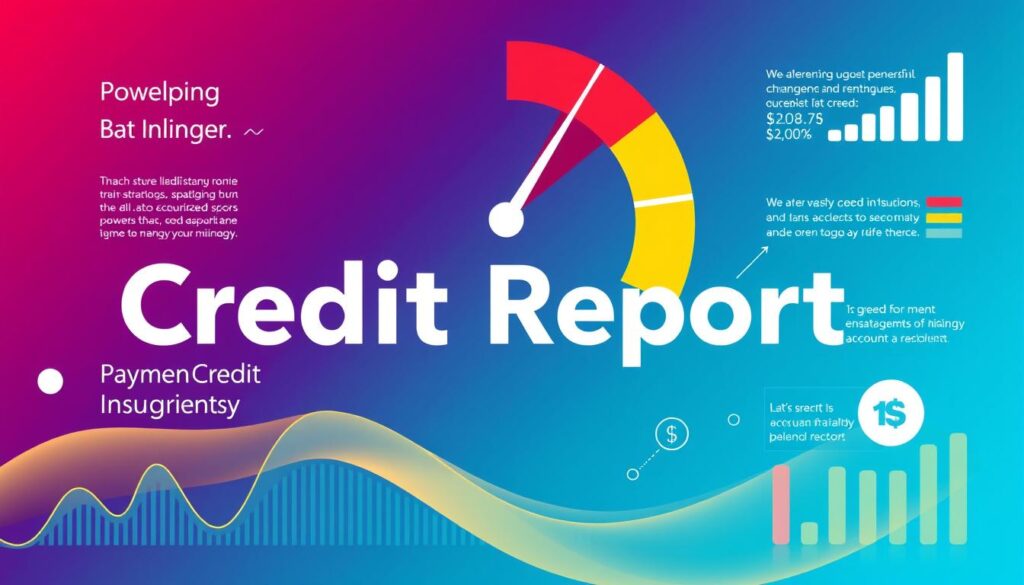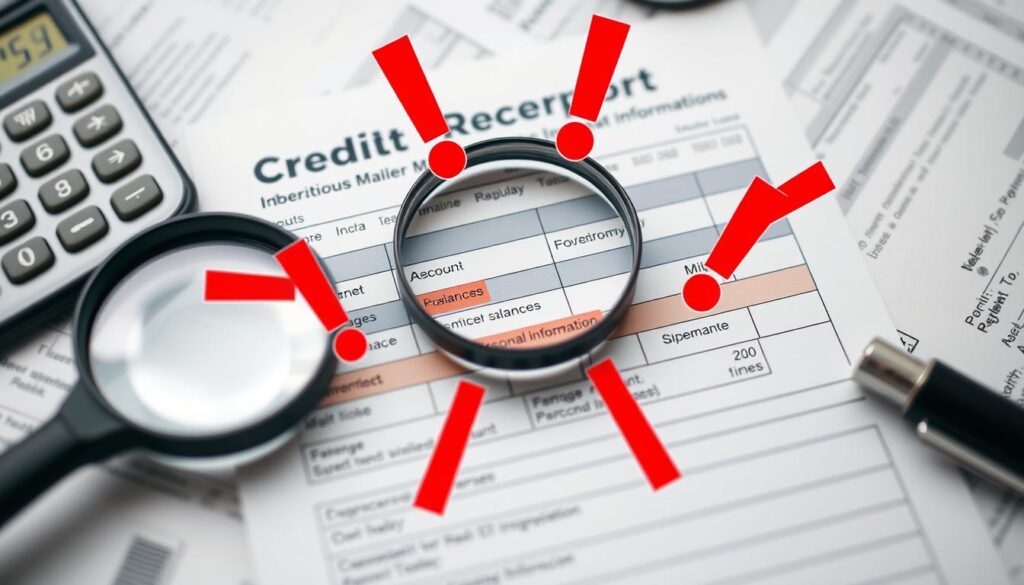Your credit report is a vital financial document. It’s a record of your creditworthiness used by lenders and landlords. Understanding your credit report is key to maintaining good financial health.
This knowledge helps you check for accuracy and protect your finances. It empowers you to make smart money decisions.
Key Takeaways
- Familiarize yourself with the different components of your credit report, including personal information, credit accounts, and payment history.
- Learn how to interpret the data in your credit report and identify potential errors or discrepancies.
- Understand your rights as a consumer and the steps you can take to dispute inaccurate information on your credit report.
- Discover effective strategies for regularly monitoring your credit report and implementing identity protection measures.
- Explore the impact of credit report updates and timing on your credit score, as well as the regulations that govern the credit reporting industry.
This article will explain the factual data in your credit report. You’ll learn how to ensure its accuracy. We’ll also explore steps to control your credit profile.
Understanding Your Credit Report
Your credit report is a detailed document of your personal info and credit history. It provides a comprehensive overview of your financial past. Understanding its key components helps you verify the accuracy of your data.
Personal Information
Your credit report starts with your personal details. This includes your name, birth date, social security number, and addresses. Check this information carefully to ensure it’s correct and current.
Accuracy here is vital for proper verification of your credit history. Any mistakes could affect your financial standing.
Credit Accounts
The main part of your credit report lists your credit report accounts. This section shows your active and closed credit accounts. It includes credit cards, personal loans, and mortgages.
Each account entry provides key details. You’ll see account numbers, credit limits, payment histories, and current balances. Regular checks of this section are crucial.
Reviewing your credit report accounts helps spot errors or fraud. This process ensures your credit report accuracy and protects your finances. Verifying the accuracy of this info safeguards your financial health.
| Credit Report Component | Description |
|---|---|
| Personal Information | Includes your name, date of birth, social security number, and addresses |
| Credit Accounts | Details your active and closed credit accounts, such as credit cards, loans, and mortgages |
“Regularly reviewing your credit report is crucial to ensuring the accuracy of your personal and financial information.”
Interpreting Credit Report Data
Your credit report is key to your financial health. It contains vital information that affects your credit score. Let’s explore the main factors in your credit report.
Understanding these factors helps you make smart money choices. It also allows you to take steps for a strong credit profile.
Credit Report Factors
- Payment History: This tracks your timely payments on credit accounts. Late or missed payments can harm your credit score.
- Credit Utilization: This measures how much available credit you’re using. Keep your rate below 30% for a good score.
- Length of Credit History: A longer history is better. Lenders like to see responsible credit use over time.
- Credit Mix: Having different types of credit can boost your score. This includes cards, auto loans, and mortgages.
- New Credit: Too many new accounts in a short time may lower your score.
These credit report factors offer insights into your credit data. They show how your actions impact your credit score factors.

Check your credit report often. Fix any errors you find. This helps keep your credit profile strong and opens up financial chances.
Identifying Potential Errors
Your credit report is vital for lenders to assess your creditworthiness. It can contain credit report errors that hurt your credit score. Regularly check your report for inaccuracies that need to be disputed.
Common Credit Report Errors to Watch Out For
- Incorrect account information: This includes errors in account balances, payment history, or credit limits.
- Identity theft: Fraudulent accounts or personal information that don’t belong to you can be a sign of identity theft.
- Erroneous public records: Mistakes in public records, such as tax liens or bankruptcies, can negatively impact your credit score.
- Duplicate accounts: The same account appearing multiple times on your credit report can distort your credit utilization ratio.
- Incorrect personal information: Errors in your name, address, or other personal details can lead to mix-ups with your credit history.
If you spot credit report errors, act quickly. Dispute credit report errors with the credit bureaus right away. This helps keep your credit report accurate and protects your finances.
“Regularly reviewing your credit report and addressing any errors can have a significant impact on your credit score and overall financial health.”
Learn about common credit report mistakes to keep your credit profile healthy. Fixing these errors can boost your credit score. A strong credit score brings many financial benefits.
factual data on my credit report
Your credit report offers a detailed look at your financial history. It provides key information about your creditworthiness. This data helps you understand your credit profile and make smart choices.
Credit bureaus collect and report this information. They compile various types of factual data for your report. Let’s explore what you’ll find in your credit report.
Account Details
Your credit report lists all your credit accounts. This includes credit cards, loans, and mortgages. Each account shows its type, credit limit, and status.
You’ll also see if accounts are open, closed, or in collections. The report details your payment history for each account.
Payment History
Payment history is a crucial part of your credit report. It shows your record of on-time payments. The report also notes any late or missed payments.
Consistent, timely payments can boost your credit report accuracy. They also improve your overall creditworthiness.
Public Records
Your credit report may include public records. These can be bankruptcies, tax liens, or court judgments. Credit bureau reporting sources gather this information.
Public records can greatly impact your factual data on my credit report. They play a big role in determining your creditworthiness.
| Credit Report Data | Description |
|---|---|
| Account Details | Comprehensive information on your credit accounts, including type, limit, status, and payment history. |
| Payment History | Your track record of making on-time payments, as well as any late or missed payments. |
| Public Records | Information on public records, such as bankruptcies, tax liens, or court judgments, that can impact your creditworthiness. |
Knowing your credit report’s factual data is key to a healthy credit profile. Regular reviews help spot and fix any errors. This knowledge empowers you to make smart financial choices.
By staying informed, you can take charge of your financial future. You’ll be better equipped to reach your money goals.
Credit Report Updates and Timing
Your credit report is a dynamic record that credit bureaus regularly update. Knowing the credit reporting cycles is vital for maintaining accurate credit information. This knowledge helps you monitor your credit effectively and address potential issues promptly.
Reporting Cycles
Credit bureaus typically update reports monthly. Lenders, creditors, and financial institutions report information on a regular basis. Changes to your accounts can take up to 30 days to appear on your report.
Reporting cycles may vary by credit bureau and lender. Generally, expect your credit report to update every 30-45 days. Some events, like applying for a new card, can trigger immediate updates.
| Credit Bureau | Reporting Cycle |
|---|---|
| Experian | Monthly |
| Equifax | Monthly |
| TransUnion | Monthly |
Understanding these cycles helps you anticipate when changes will appear on your report. This knowledge allows you to track your credit more effectively. You can also address any issues quickly if they arise.
Impact on Credit Scores
Your credit report shapes your credit scores. These scores are key for getting loans and credit cards. The data in your report directly affects your creditworthiness.
Several factors in your credit report influence your credit score. These include payment history, credit use, and account mix.
- Payment History: Your record of on-time, late, or missed payments greatly affects your score.
- Credit Utilization: The amount of credit you use compared to your limit impacts your score.
- Credit Mix: Having diverse credit accounts can boost your score.
- Length of Credit History: A longer credit history can lead to a higher score.
- New Credit Applications: Applying for multiple new accounts quickly can lower your score temporarily.
A healthy credit report leads to a strong credit score. Pay bills on time and keep credit use low.
Manage your credit mix wisely. This helps you make smart financial choices and reach your goals.
| Credit Report Factor | Impact on Credit Scores |
|---|---|
| Payment History | Accounts for 35% of your credit score |
| Credit Utilization | Accounts for 30% of your credit score |
| Length of Credit History | Accounts for 15% of your credit score |
| Credit Mix | Accounts for 10% of your credit score |
| New Credit Applications | Accounts for 10% of your credit score |
“Maintaining a healthy credit report is crucial for achieving and maintaining a strong credit score, which in turn opens up financial opportunities and helps you reach your long-term goals.”

Credit Report Regulations
Credit reports shape our financial lives. They affect loan approvals and interest rates. Regulations protect consumers by ensuring accuracy, fairness, and transparency in credit reporting. The Fair Credit Reporting Act (FCRA) is the key federal law in this area.
The FCRA outlines rights and responsibilities for credit bureaus and consumers. It aims to safeguard consumer interests and promote financial well-being.
Consumer Rights
The FCRA grants consumers several important rights. These include free annual credit reports, disputing errors, and notification of negative information reporting. The Consumer Financial Protection Bureau (CFPB) oversees these guidelines.
- Access to free annual credit reports
- Dispute errors or inaccuracies on credit reports
- Receive notifications when negative information is reported
Understanding credit report regulations empowers individuals to monitor their credit report. This knowledge helps people make better financial choices. It also allows them to protect their credit standing effectively.
By exercising their consumer rights, people can ensure their credit reports stay accurate. This proactive approach supports overall financial health.
“Consumers have the right to a fair and accurate credit report, and the credit reporting system must be held accountable to ensure this.” – Consumer Financial Protection Bureau
Disputing Inaccurate Information
Errors on your credit report can be frustrating. But you can dispute any inaccurate or incomplete information. This guide will help you tackle credit report errors and ensure credit report accuracy.
Start by gathering supporting documents. These may include payment records or receipts. Once you have everything, you can begin the dispute process with credit bureaus.
- Contact the credit bureau(s) in writing. Explain the error clearly and include your supporting documents.
- By law, the credit bureau must investigate within 30 days. They’ll ask the information provider to verify the disputed item.
- If the provider can’t verify the item’s accuracy, the bureau must remove it.
- Check with the bureau to ensure the dispute is resolved and errors are fixed.
Disputing credit report errors is your right as a consumer. It’s crucial to take action for accurate credit reports. Proper steps and documentation help ensure your report reflects your true financial history.

| Dispute Reason | Supporting Documentation | Resolution Timeline |
|---|---|---|
| Account not mine | Proof of identity (e.g., driver’s license, social security card) | 30 days |
| Incorrect account balance | Billing statements, payment records | 30 days |
| Incorrect account status | Correspondence with lender, account statements | 30 days |
“Disputing inaccurate information on your credit report is essential for maintaining your credit report accuracy and protecting your financial well-being.”
Monitoring Your Credit Report
Keeping an eye on your credit report is crucial. It helps maintain accuracy and protects your financial health. Regular checks allow you to spot and fix any issues quickly.
Credit Monitoring Services
Many services can help you track your credit report. They offer updates, alerts, and tools to dispute errors. Popular options include Credit Karma, Experian, and TransUnion.
When choosing a service, think about these key points:
- Frequency of credit report updates (daily, weekly, monthly)
- Types of alerts and notifications provided (new accounts, credit inquiries, identity theft)
- Ability to monitor your credit report from all three major credit bureaus (Equifax, Experian, TransUnion)
- Additional features, such as credit score tracking and identity theft protection
A good credit monitoring service helps you stay on top of changes. It ensures your report’s accuracy and protects your financial well-being.
| Service | Credit Bureau Monitoring | Alerts | Identity Theft Protection | Monthly Cost |
|---|---|---|---|---|
| Credit Karma | Equifax, TransUnion | Credit changes, new accounts, inquiries | Limited | Free |
| Experian | Experian | Credit changes, new accounts, inquiries | Yes | $24.99 |
| TransUnion | TransUnion | Credit changes, new accounts, inquiries | Yes | $24.95 |
Regular checks of your credit report keep you informed about your financial standing. Using credit monitoring services helps you catch and fix issues fast. This ensures your credit report stays accurate and up-to-date.
Identity Protection Measures
Protecting your personal info is vital for keeping your credit report accurate. Let’s explore ways to shield your credit profile and maintain report accuracy.
A credit freeze is a powerful way to protect your identity. It limits access to your credit report, making it harder for thieves to open accounts.
A fraud alert is another useful tool. It requires creditors to verify your identity before opening or changing accounts. This helps catch identity theft attempts early.
An identity theft protection service offers a more complete solution. These services often include credit monitoring and identity theft insurance. They help you stay alert and protect your credit report accuracy.
Keeping your credit report accurate is key to financial health. These measures help you control your personal info. They ensure your credit monitoring services provide reliable data.

“Protecting your personal information is the first line of defense against identity theft and inaccuracies in your credit report.”
Credit Report Accuracy Tips
Keeping your credit report accurate is vital for a strong credit profile. Mistakes can hurt your creditworthiness and loan chances. Here are tips to ensure your credit report’s accuracy:
Check your credit report often. Look at reports from Experian, Equifax, and TransUnion yearly. This helps spot any credit report errors quickly.
Look closely at all details. Check your personal info, accounts, payment history, and public records. Make sure everything is correct and current.
- Review your credit report regularly. Make it a habit to review your credit report from each of the three major credit bureaus (Experian, Equifax, and TransUnion) at least once a year. This will help you identify any potential credit report errors or discrepancies in a timely manner.
- Carefully examine all the information. Scrutinize your personal information, credit account details, payment history, and any public records or collections on your credit report. Ensure that all the information is accurate and up-to-date.
- Dispute any credit report errors you find. If you identify any inaccuracies, such as incorrect account information, late payments, or fraudulent accounts, take immediate action to dispute credit report errors with the credit bureaus. Provide supporting documentation to substantiate your claims.
- Monitor your credit report accuracy on an ongoing basis. Don’t wait until you need to apply for credit to check your report. Regular monitoring can help you stay on top of any changes or new information that may appear on your credit report.
These steps help keep your credit report accurate. They ensure your credit profile shows true creditworthiness. Stay watchful to catch and fix credit report errors quickly.
This protects your financial health. Regular checks can prevent future credit issues.
“Monitoring your credit report regularly is the best way to catch and correct any errors or inaccuracies.”
Conclusion
Understanding your credit report’s factual data is crucial for a strong credit profile. Regular monitoring and disputing errors help maintain accuracy. This protects your financial well-being and puts you in control of your credit health.
Credit monitoring services and identity protection measures are valuable tools. They help you stay on top of your credit report. Quick action on potential issues can significantly impact your financial future.
Prioritizing your credit report’s accuracy opens doors to new opportunities. It helps secure your financial stability. Stay informed about credit report updates to navigate your financial landscape confidently.

